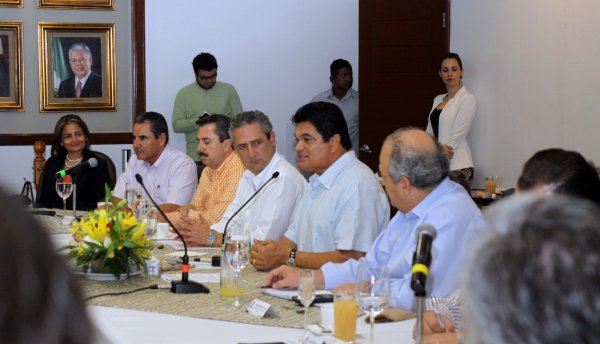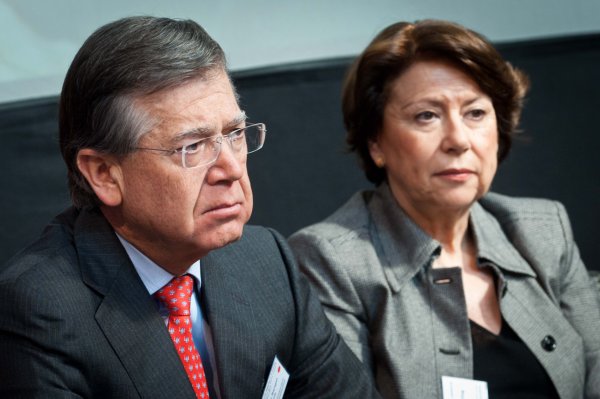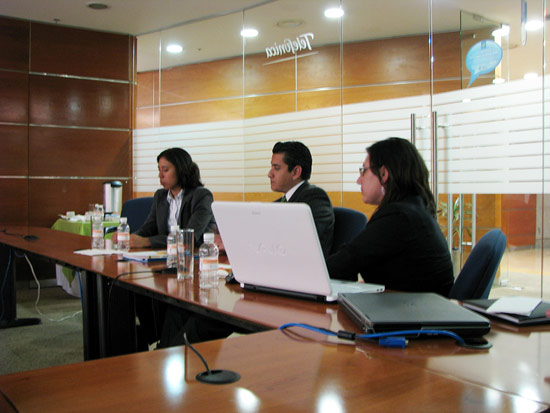Business Culture: Business Meetings
When doing business in Mexico, know that a local should broker business deals. Make your appointments in advance, but expect the unexpected: changes in schedule are common, including last-minute cancellations. Be patient and follow up if necessary. Attire is an important aspect of making a positive impression, and it is imperative that your business attire is formal, conservative, and of good quality. Make sure to greet your fellow businesspeople with a handshake and eye contact. Also, expect to try the local fare, as food and drink are served during business negotiations.
Preparation
When preparing to do business in Mexico, you will need to find a local intermediary. Mexicans prefer to do business with insiders whom they know and trust, so don’t expect to make a cold call and set up an appointment without a suitable introduction. There are a large number of suitable agents you can find on the Internet. Most countries have a commercial services division in their embassies that can provide you with a contact list of reliable agents. The basis of all Mexican business deals starts with a personal relationship, and there is no way to cut corners on this fact.
You can make appointments only a few weeks in advance, but never drop in unexpectedly, as you will usually be turned down for an interview. E-mail is widely available and can be used to establish initial contact. Eventually, you will need to make telephone contact, but this can be near the end of the process. English is widely spoken, especially in the big cities and tourist sites on the coast. While local interpreters are easily hired, it would be preferable to have a colleague who speaks Spanish and who even has Mexican ancestry.
Spanish is not an especially difficult language to learn, and even a few words will serve you well.
Additional phrases can be found at www.omniglot.com.
| English | Spanish |
|---|---|
| Hello | Hola |
| Goodbye | Chau; Adiós |
| Good morning | Buenos días |
| Good afternoon | Buenas tardes |
| Good evening | Buenas noches |
| Thank you | Gracias |
| You’re welcome | De nada |
| How are you? (Formal) | ¿Cómo está usted? |
| Fine, thanks; and you? (Formal) | Bien gracias, ¿y usted? |
| Excuse me | Pardon |
| My name is... (literally, "I am called...") | Me llamo... |
If you are traveling to Mexico City, you may want to arrive a few days before your meeting in order to become accustomed to the higher altitude. Some foreigners are unaccustomed to the heat and the altitude, but adjust after a day or so.
Scheduling
Mexico operates at a slower pace than Europe and the United States. While it is generally considerate for you to be punctual, you may have to wait as long as 30 minutes for your counterparts. The traffic in all the major cities, especially Mexico City, is horrendous, so plan to leave early for your meeting. Call in advance if you are going to be late; this is to be expected, and you will not be thought any less of as long as you call.
You should be prepared for unexpected changes in schedule. Meetings get cancelled at the last minute, or the times are adjusted. This can be frustrating, so if you are on a tight timetable, you should make that clear to the person who is scheduling the event. Mexicans observe a number of Roman Catholic and national holidays, when many businesses are closed. The workweek runs from Monday through Friday. There is no special annual vacation period, although the summer months tend to be slower paced, with fewer people at work.
The business day usually starts around 9a.m., or there may be an early-morning working breakfast. Lunch is the main meal of the day; it can last two hours, and business may be conducted, albeit in a more informal manner. Alcohol will be served, mostly beer during the day, and you will be expected to participate unless you have a very good excuse not to.
Business Attire
Mexican business dress is formal and conservative, and you will be judged on your taste and quality of clothes. Men should wear a dark suit and tie and women a business outfit with skirt or slacks. Mexico is still a “macho” society, but professional women participate in all levels of business activities and should not suffer any repercussions from gender discrimination.
If the weather is especially hot, you may be able to wear more casual clothes at subsequent meetings. Follow the lead of your host as to what is appropriate.
Meeting Protocol
There is a hierarchy in Mexican business culture that grants respect less on the basis of ability and more on age and authority. You may find that the senior person attends only the first and last meeting, and in between you will be dealing with personnel who are matched to the age and rank of your negotiating team. You should be respectful of this mid-level staff, as they will pass on information to the senior decision-makers.
Entering the Meeting Room: Hierarchy
Before the meeting, submit a list of your personnel with their expertise and request a similar list from your hosts. Study the list you receive so you can identify participants by name. Your contact person may have valuable information on some of the people you will meet.
Introductions
Personally greet each of your Mexican counterparts while you make direct eye contact. The most common greeting is “Buenas días.” A firm handshake is expected, and shaking women’s hands is permitted, as is establishing reasonable eye contact between genders. The custom is repeated at the end of the meeting.
Mexicans, especially in the south, will stand very close to you when they talk. If this is not your cultural style, you may feel uncomfortable. You can either maintain the close contact or you can step back tactfully and assume the distance you feel more comfortable with; most people will not be offended if you require more distance. You can expect the Mexicans to be a bit distant and guarded at the initial introductions, but this will quickly change if the relationship building goes smoothly.
Forms of Address
Mexican professionals should be addressed by their occupational title—for example, Doctor or Professor. Senior staff should also be addressed as Señor or Señora, and untitled staff people are commonly greeted more informally, using their first names.
Business Cards
Mexico is no exception to the common ritual of exchanging business cards, although you will find that it is not as formal a custom as elsewhere. It is always a good idea to print Spanish on one side and present that side to your counterpart. Many lower-level staff will not have business cards; if you are not sure, you can wait for them to offer the exchange.
Body Language
Once they warm up, Mexicans will be very animated with the gestures they use in their social conversations. Eye contact is a measure of sincerity and honesty, so be sure to maintain eye contact when speaking with your Mexican counterpart.
It is not uncommon for people who are friends or have previously done business together to hug each other or pat each other on the back upon entering or leaving a meeting. You will not be expected to act this way, but should be prepared for some physical touching as a gesture of good feelings.
Meeting Starters: Small Talk versus Getting Down to Business
All meetings will start with a cup of coffee, which you are expected to accept. Mexico is still a tobacco-smoking culture, although there are increasingly limitations on where one can smoke. If smoking in the office is prohibited, there will be a separate location for smokers, which usually provides a good opportunity to socialize.
You will have plenty of opportunity for small talk. Mexicans love to talk about their country, and if you have traveled in the area, this will be a ready conversational topic. Also, most Mexicans either have been outside their country or have relatives who have traveled, and it is appropriate to discuss these travels.
Conducting the Meeting
The pace of the business meeting will generally be slow in the North and even slower in the South. Delays will appear at every level, from the delivery of the coffee to the signing of the final agreement. There will also be many bureaucratic hurdles that need to be addressed. You need to be patient and wait for the process to operate on its own schedule, if you show impatience this could be a sign that you do not have the resolve to participate in the negotiations. The Mexicans may exploit this as a strategic weakness on your part. You can try to move the proceedings along towards the issues that are important to you, but you cannot be insistent or make demands, as this strategy will backfire on you.
You need to be sensitive to the difference between doing business with people from the southern regions and with ones from the northern cities. The former will seem more “Latin”, the latter more “American.”
Decision Making
Although the most senior members of any business always make final decisions, the process in Mexico will start at the bottom and slowly make its way up the hierarchy. This slow process is usually not a negotiating strategy, but a time-honored cultural tradition. Also you can expect some indirect governmental intervention in any business deals, especially in the form of rules and regulations. It is customary for your hosts to know about these requirements and to make the necessary arrangements to comply with them. Your contact person may offer some assistance in this regard.
Gifts and Splitting the Bill
Gift giving is not required, but if your business has an interesting novelty with a company logo, you should offer it at the beginning of the meeting.
Mexico is a food-oriented country, and you will be required to eat and drink as part of any business negotiation. It is generally assumed that the host will pay for the first meal and the other side will reciprocate when it is their turn.
Follow-up
You will always need to follow-up any meeting. Mexicans are not known for their attention to post-meeting details, and they are notoriously slack at meeting mutually agreed deadlines. You may need to be aggressive in order to get people’s attention, especially after the senior decision-makers have moved on to other matters. Don’t be shy—in Mexico speaking up is the way to get things done.
Before the meeting disbands, insist on knowing the names and contact information for everyone who has responsibility for compliance with the terms of the agreement. You may need to be pushy, because once these people leave the meeting, they may be hard to find. A follow-up of about one week is acceptable, but if you have any concerns about performance, you shouldn’t hesitate to call within a few days to check up on things.
Copyright © 1993—2024 World Trade Press. All rights reserved.

 Mexico
Mexico 

